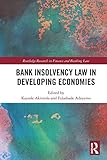Bank insolvency law in developing economies / edited by Kayode Akintola and Folashade Adeyemo
Material type: TextPublication details: New York: Routledge, 2023Description: 196p. 23cmISBN:
TextPublication details: New York: Routledge, 2023Description: 196p. 23cmISBN: - 9781032003979
- 346.078 BAN
| Item type | Current library | Call number | Status | Date due | Barcode | |
|---|---|---|---|---|---|---|
 Books
Books
|
Central Library | 346.078 BAN (Browse shelf(Opens below)) | Available | 000963 |
Browsing Central Library shelves Close shelf browser (Hides shelf browser)

|

|

|

|

|

|

|
||
| 346.077 THA NPA Legislations in India : Law and Finance Series / | 346.077 THA NPA Legislations in India : Law and Finance Series / | 346.077 THA NPA Legislations in India : Law and Finance Series / | 346.078 BAN Bank insolvency law in developing economies / | 346.078 WAH Treatise on insolvency and bankruptcy code, Vol-1 / | 346.078 WAH Treatise on insolvency and bankruptcy code, Vol-2 / | 346.082 ECO Economics Of Financial Law Vol. 1 / |
Part I
Bank Insolvencies in Developing Economies
1. Prologue - The Management of Distressed Banks in Developing Economies
2. Distressed Banks and Asset Management Companies: Evaluating ‘AMCON’ as a Bank Resolution Tool for Managing Non-Performing Loans in Nigeria
3. Unravelling the Mystery behind Bank Insolvencies in the East African Community (EAC) – The case for Uganda, Kenya and Tanzania
4. Towards Early Intervention in the Resolution of Banks’ Financial Distress in in Ghana
5. Deposit Protection Schemes in Effective Bank Resolution Regimes: Kenya’s Experience
Part II
Bank Insolvency Law: Selected Cross-Border Paradigms
6. Institutional Development of the Dubai International Financial Centre and the Qatar Financial Centre: The Insolvency Law Framework
7. Cyprus after the 2013 Banking Crisis: The Journey towards Recovery
8. Bank Insolvencies and the UNCITRAL Model Law
Postscript
The subject of bank stability has been under a great amount of political and legislative scrutiny since the mid-2007 to late-2009 global financial crisis. However, these efforts have centred on developed economies. Little coverage is given to strategies adopted by many developing economies. While there is a global discourse on the subject of insolvency generally, there is ample scope to contribute to the growing body of work on the narrow subject of bank insolvencies. This book provides a unique perspective on an emerging theme in at least two respects. First is the focus on selected developing economies and selected developed economies in the EMEA region alongside cross-border developments, with the objective of deciphering the regulatory approach to bank insolvencies. The second is the analytical consideration of methods that may be implemented to preclude or resolve bank insolvencies in developing economies. This book explores the nexus between developing economies and their banking institutions. Developing economies are acutely dependent on their banks for the functioning of their cash-based economies. Recent events, however, suggest a weakness in the long-term viability of some of their banks and a mixed-bag regulatory approach to redress this weakness. This book evaluates the effectiveness of regulatory frameworks in selected developing economies that are designed to prevent or resolve the insolvency of banks. At a time of global economic uncertainty, this book will prove to be a valuable resource to the discourse on the viability of banks, businesses, and economies in developing States.(Source: https://www.routledge.com/Bank-Insolvency-Law-in-Developing-Economies/Akintola-Adeyemo/p/book/9781032003979?srsltid=AfmBOopNSheYXL4PctmOFaUN1AidFnB6AbjPIJPyMEvWmPRtdd7yEsnH)
There are no comments on this title.

